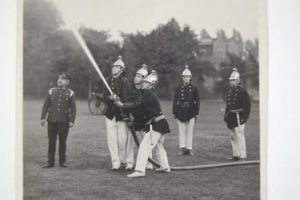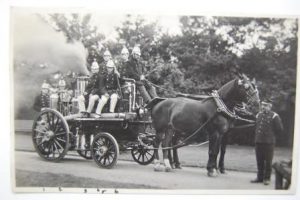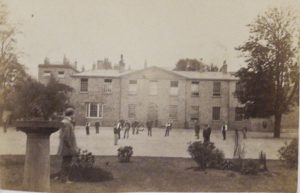In January I did a talk as part of the Thursday lunchtime recital room series. It was entitled ‘Memories from the Archives’ and I talked about a number of memories from Old Scholars. I’ll share the photographs and text from the talk in several parts on the blog. Read Part 1 here, Part 2 here, Part 3 here, Part 4 here and Part 5 here.
Moving on into the 20th century now, Eric Henry Richardson was at Bootham between 1901 and 1904, during the rebuilding and opening of the new buildings after the fire. He recounts his experiences in the school fire brigade in the 1914 Register. Below are photographs of the fire brigade from 1911, slightly later than Eric’s time, but they give an idea of what the fire brigade looked like.


“During my captaincy of the Fire Brigade I had the “privilege” of extinguishing an outbreak of fire in No. 2 bedroom. This was caused by the fusion of an electric light wire melting the adjoining gas pipe and igniting the gas under the floor. The thoughtfulness of Stephenson in turning off the gas meter in some mysterious corner of his “hole”, quenched the outbreak discouragingly soon from the Brigade point of view. One of the masters, realising with great presence of mind that some implement was necessary to tear up the boarding and get to the seat of the trouble, rushed downstairs, obtained a pickaxe from Stephenson (who had already turned off the gas), and proceeded, by excited miss-hits, to do considerable damage to both sound floor boards and mantelpiece jambs. With one bucket of water my Brigade extinguished the smouldering boards, but I have always somehow entertained a sneaking feeling that the honours of the day were with Stephenson. This outbreak occurred at 6.55am, just as the boys were dressing. If the wire had fused 10 minutes later when everyone was in the John Bright Library, the consequences must have been disastrous, and Bootham would have had for a second time to rise Phœnix like from her ashes with greater glory still.”.
The programme for the 2015-16 series of Thursday Recital Room events can be found on the school website.


